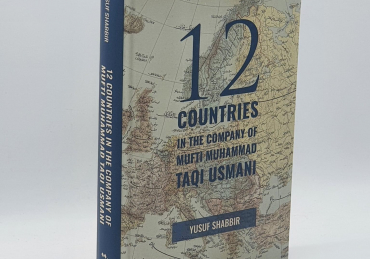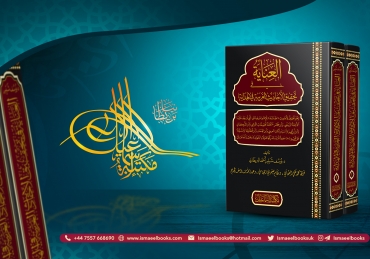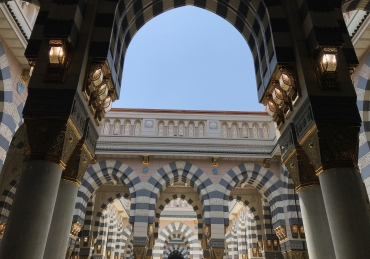Adhkār and the protection of Shaykh al-Islām Mufti Muhammad Taqi Usmani from assassins
بسم الله الرحمن الرحیم
Two days ago, we all received the shocking news of the assassination attempt on the life of Shaykh al-Islām Mufti Muhammad Taqi Usmani (b. 1362/1943) in Karachi as he travelled for Jumuʿah Ṣalāh from Darul Uloom Karachi to the Bayt-ul-Mukarram Mosque. It was exactly four weeks ago that I had spent Friday together with Mufti Ṣāḥib in the blessed city of Madīnah, as outlined in an earlier article.
Mufti Ṣāḥib was accompanied in the car with his driver, a police guard, his wife and two grandchildren. Gunmen on three motorbikes attacked the vehicle twice. The target was Mufti Ṣāḥib. The police guard was martyred and the driver was injured, who despite one of his hands being severely injured, continued to drive courageously with his other hand. Another car travelling together was also attacked and a second person was martyred and another person was severely injured. The news started to spread and condemnations started to pour in from across the world.
Later in the day, Mufti Ṣāḥib outlined in a speech at Darul Uloom Karachi what had occurred. It was nothing short of a miracle, he explained, as bullets rained in from all four sides not once but twice. Video footage released later on social media affirms that it was a sophisticated attack with the location chosen very carefully. Allah Almighty had decreed that Mufti Ṣāḥib and his family members were not to be injured at all, despite the windows of the car shattering and the driver and guard sustaining injuries. As Allah Almighty says in the Qurʾān:
ومكروا ومكر الله والله خير الماكرين
And they plan, and Allah plans, and Allah is the best of planners (8:30).
Yesterday, my respected mother Umm Muḥammad (b. 1387/1967) informed me that Khalā Jān, Umm ʿImrān, the respected wife of Mufti Ṣāḥib had informed her that Mufti Ṣāḥib had received death threats in the past and that she reads the supplication of the companion Anas ibn Mālik (d. 93/711-2) (may Allah be pleased with him) for protection on a daily basis. She gave a copy of the supplication to my mother and advised her to read this supplication regularly. This is the supplication, which according to some narrations, protected Anas ibn Mālik (may Allah be pleased with him) from the oppression of Ḥajjāj ibn Yūsuf (d. 95/714). Ḥajjāj was unable to fulfil his threat to hit him. Sayyidunā Anas (may Allah be pleased with him) informed him that he will be unable to fulfil his threat despite being in front of him, because the Prophet ﷺ taught him a supplication which guarantees protection from Shayṭān, oppressors and animals. Imam Ibn al-Sunnī (d. 364/975) and others have transmitted this narration though there is a variation in the wording of the narration and the supplication (see ʿAmal al-Yawm wa al-Laylah, 346; al-Duʿāʾ of Ṭabarānī, 1059; Tārīkh Ibn ʿAsākir, 52:259; al-Muntaẓam, 6:339; al-Tadwīn fī Akhbār Qazwīn, 1:123; al-Khaṣāʾiṣ al-Kubrā, 2:298). The supplication in the narration of al-Tadwīn is as follows (which includes the recitation of Sūrah al-Ikhlāṣ five times in total at the end):
اللهُ أَكْبَر اللهُ أَكْبَر، بِسْمِ اللهِ عَلَى نَفْسِي وَدِينِي، بِسْمِ اللهِ عَلَى كُلِّ شَيْءٍ أَعْطَانِي رَبِّي، بِسْمِ اللهِ خَيْرِ الأَسْماءِ، بِسْمِ اللهِ رَبِّ الأَرْضِ وَالسَّمَاءِ، بِسْمِ اللهِ الَّذِي لا يَضُرُّ مَعَ اسْمِهِ شَيْءٌ، بِسْمِ اللهِ افْتَتَحْتُ وَعَلَى اللهِ تَوَكَّلْتُ اللهُ اللهُ رَبِّي، لا أُشْرِكُ بِهِ شَيْئًا، اللَّهُمَّ إِنِّي أَسْأَلُكَ مِنْ خَيْرِكَ الَّذِي لا يُعْطِيهِ غَيْرُكَ، عَزَّ جَارُكَ وَجَلَّ ثَنَاؤُكَ وَلا إِلَهَ غَيْرُكَ، اِجْعَلْنِي فِي عِيَاذِكَ مِنْ كُلِّ سُوءٍ وَمِنَ الشَّيْطَانِ الرَّجِيم، اللَّهُمَّ إِنِّي أَحْتَرِسُ بِكَ مِنْ كُلِّ شَيْءٍ خَلَقْتَ وَأَحْتَرِزُ بِكَ مِنْهُمْ، وَأُقَدِّمُ بَيْنَ يَدَيَّ بِسْمِ اللَّهِ الرَّحْمَنِ الرَّحِيمِ، قُلْ هُوَ اللهُ أَحَدٌ اللهُ الصَّمَدُ لَمْ يَلِدْ وَلَمْ يُولَدْ وَلَمْ يَكُنْ لَهُ كُفُوا أَحَدٌ، وَمِنْ خَلْفِي مِثْلَ ذَلِكَ وَعَنْ يَمِينِي مِثْلَ ذَلِكَ وَعَنْ يَسَارِي مِثْلَ ذَلِكَ وَمِنْ فَوْقِي مِثْلَ ذَلِكَ
Although the chains of these narrations are very weak, various parts of the supplication are transmitted in authentic narrations. In particular, an authentic ḥadīth narrated by the companion ʿUthmān ibn ʿAffān (d. 35/656, may Allah be pleased with him) from the Prophet ﷺ mentions, “There is no servant who says in the morning of every day and the evening of every night:
بِسْمِ اللهِ الَّذِي لاَ يَضُرُّ مَعَ اسْمِهِ شَيْءٌ فِي الأَرْضِ وَلاَ فِي السَّمَاءِ وَهُوَ السَّمِيعُ الْعَلِيمُ
In the Name of Allah, who with His Name, nothing in the earth or the sky can cause harm, and He is the Hearing, the Knowing
three times, (except that) nothing shall harm him. Abān [the transmitter of the ḥadīth) had been stricken with a type of semi-paralysis, so a man began to look at him, so Abān said to him, ‘What are you looking at? Indeed, the ḥadīth is as I reported it to you, but I did not say it one day, so Allah brought about His decree upon me’” (Sunan al-Tirmidhī, 3388; Sunan Abī Dāwūd, 5088; Sunan Ibn Mājah, 3869; al-Adab al-Mufrad, 660; Ṣaḥīḥ Ibn Ḥibbān, 852 – declared ṣaḥīḥ by Imam Tirmidhī, Imam Ibn Ḥibbān and others).
It is highly recommended for a person to memorise and read this short supplication three times after Fajr time begins before sunrise and three times after sunset every day. This is a very simple prescription for protection.
In addition to this, a person should make a habit of reciting Āyat al-Kursī once in the morning and once in the evening (al-Sunan al-Kubrā, 10731; al-Muʿjam al-Kabīr, 541; al-Mustadrak, 2064 – declared ṣaḥīḥ by Imam Ḥākim, Imam Ibn Ḥibbān and others) and also before sleeping (Ṣaḥīḥ al-Bukhārī, 2311), this is also a means of protection.
In addition to this, reciting the three quls (Sūrahs al-Ikhlāṣ, al-Falaq and al-Nās) thrice in the morning and thrice in the evening is highly recommended. The Prophet ﷺ said, “They will suffice you from everything” (Ṣunan al-Tirmidhī, 3575; Sunan Abī Dāwūd, 5082; Sunan al-Nasāʾī, 5428 – declared ṣaḥīḥ by Imam Tirmidhī and Imam Nawawī and ḥasan by Ḥāfiẓ Ibn Ḥajar). Sūrah al-Ikhlāṣ is also mentioned in the aforementioned supplication of Sayyidunā Anas (may Allah be pleased with him).
There are also other supplications mentioned in the narrations as outlined on this link which can be downloaded and saved on mobile phones. The three supplications mentioned above are easy for people to remember and practice upon and they are sourced from authentic narrations. Mufti Ṣāḥib also has a publication ‘Radiant Prayers’ which outlines supplications for different occasions, it can be downloaded from this link and I understand from my colleague Yahya Batha of Turath Publishers that a revised edition will be published soon. In addition to this, Turath Publishers have already published ‘Easy Good Deeds’ written by Mufti Ṣāḥib, which is very beneficial.
Having remained in the company and travelled with Shaykh al-Islām Mufti Muhammad Taqi Usmani and Khālā Jān on many occasions over the past eight years, I have always observed both extremely punctual with their daily adhkār and supplications. Although Mufti Ṣāḥib is not a ḥāfiẓ of the Qurʾān, he has a daily habit of reciting one Juzʾ of the Qurʾān including during his travels. During the assassination attempt, both Mufti Ṣāḥib and Khālā Jān were reciting the Qurʾān, Mufti Ṣāḥib was reciting Sūrah al-Kahf, and Khālā recited the following verse during the attack:
وَجَعَلْنَا مِنْ بَيْنِ أَيْدِيهِمْ سَدًّا وَمِنْ خَلْفِهِمْ سَدًّا فَأَغْشَيْنَاهُمْ فَهُمْ لَا يُبْصِرُونَ
And We have placed a barrier in front of them and a barrier behind them, and (thus) they are encircled by Us; so they do not see. (From Mufti Ṣāḥib’s translation)
Everyone has to die at their appointed times and Allah Almighty is the best of planners. A variety of explanations can be given for why Mufti Ṣāḥib and Khālā Jān were protected in this particular incident. My respected father Mufti Shabbir Ahmad (b. 1376/1957) suggested that this was a result of the blessings of the Adhkār and in particular the supplication of Sayyidunā Anas.
Therefore,
- A very important lesson to be learnt from this assassination attempt is the power of adhkār, supplications and the recitation of the Qurʾān on a daily basis. Some other lessons are outlined here in brief.
- Taqdīr (fate) – Only Allah Almighty knows when harm will come to a person. As the Prophet ﷺ said, “Know that if the entire Ummah were to gather to benefit you with something, they would not benefit you except with something Allah has written for you. And if they were to gather to harm you with something, they will not harm you except with something Allah has written for you” (Sunan al-Tirmidhī, 2516 – declared ṣaḥīḥ by Imam Tirmidhī).
- The same ḥadīth of Sunan al-Tirmidhī (2516) mentions, “Be mindful of Allah and He will protect you. Be mindful of Allah and you will find Him before you.”
- Death – Only Allah Almighty knows when, where and how a person will pass away.
- Courage and Bravery – The courage and bravery of the driver who continued to drive with one hand and also the courage and bravery of Mufti Ṣāḥib for offering to drive the car and the calm and effective handling of the entire crisis thereafter, including providing comfort to others and avoiding any form of inflammatory statements. In fact, a short while ago, Mufti Ṣāḥib instructed followers on his Twitter Feed that this incident must not be associated in any way with A person’s reaction and behaviour during such difficult and testing times unveil and truly demonstrate their innate qualities, as we have also seen recently in the response of the Prime Minister of New Zealand to the terrorist attack on the mosque in Christchurch. She personally consoled those who have been affected with a scarf over her head. Her handling of the whole crisis demonstrates courage, empathy, humility and a commitment to champion the rights of the oppressed and defend Muslims from Islamophobia. As Mufti Ṣāḥib tweeted a few days ago, “The way the PM of New Zealand has showed sympathy not only for those affected but to the entire community and the way the parliament started its session with recitation of the Holy Quran and condemned those spreading hate is highly commendable and an example for the whole world.”
- Safety and security are great blessings of Allah Almighty, for which we should always be grateful.
- Taking necessary precautions conforms to Islamic teachings and a person should adopt the necessary measures to protect himself. Nevertheless, if Allah Almighty has planned otherwise, harm can reach the person and vice versa. There are many examples of successful assassinations despite comprehensive armed security. In the end, it is taqdīr (fate) that supersedes everything.
- Criminality and aggression have no limits. Criminals are killing people in broad daylight throughout the world with different motives. May Allah protect us all.
- The condemnation of this assassination attempt from scholars, activists, politicians, and a broad section of society from all over the world reflect the widespread love and affection for Mufti Ṣāḥib in the hearts of the people and his scholarly contribution. This is a sign of acceptance from Allah. As the Prophet ﷺ said, “When Allah loves a servant, He calls out to Jibrīl and says: I love so-and-so, so love him. Then Jibril loves him. After that Jibrīl announces to the inhabitants of heavens that Allah loves so-and-so, so love him, and the inhabitants of the heavens also love him, then acceptance is placed for him on earth (Ṣaḥīḥ al-Bukhārī, 3209).
- A difficulty is also a blessing for a true believer. The Prophet ﷺ said, “How amazing is the case of a believer, indeed all his affairs are good for him, and this is only for the believer. If prosperity reaches him, he expresses gratitude (to Allah) and that is good for him, and if adversity befalls him, he exercises patience and that is good for him” (Ṣaḥīḥ Muslim, 2999).
We should all be grateful to Allah Almighty for protecting Mufti Ṣāḥib, for his presence is a source of illumination and blessing for humanity. We pray to Allah Almighty to continue to protect Mufti Ṣāḥib and his family and lengthen his shadow over us with ʿĀfiyah. May Allah Almighty continue to benefit us and the Ummah through the profound knowledge and wisdom of Mufti Ṣāḥib. May Allah Almighty grant Paradise to the two martyrs in this incident and the martyrs of New Zealand and cure all those who are injured and grant patience to all their families and associates. Āmīn.
Yusuf Shabbir
18 Rajab 1440 / 24 March 2019
Further to writing the above, the writer has received a message from a close associate of Mufti Ṣāḥib that he, Khālā Jān and the driver had recited the supplication of Anas ibn Mālik (may Allah be pleased with him) that day and that Mufti Ṣāḥib mentioned that what occurred appears to be the blessing of this supplication. Further, a PDF has been shared prepared by a reputable teacher of Darul Uloom Karachi, which is available on this link containing this supplication with a variation, although we have been unable to locate this version. Mufti Ṣāḥib also confirmed in an interview later that he had recited this supplication on that day. He also mentioned in the interview that he had requested the Afghan Taliban to demand for the release of Dr Aafia Siddiqui, as part of the negotiations with the United States. We pray to Allah Almighty to create the means for her release and for the release of all those who are wrongly imprisoned.







